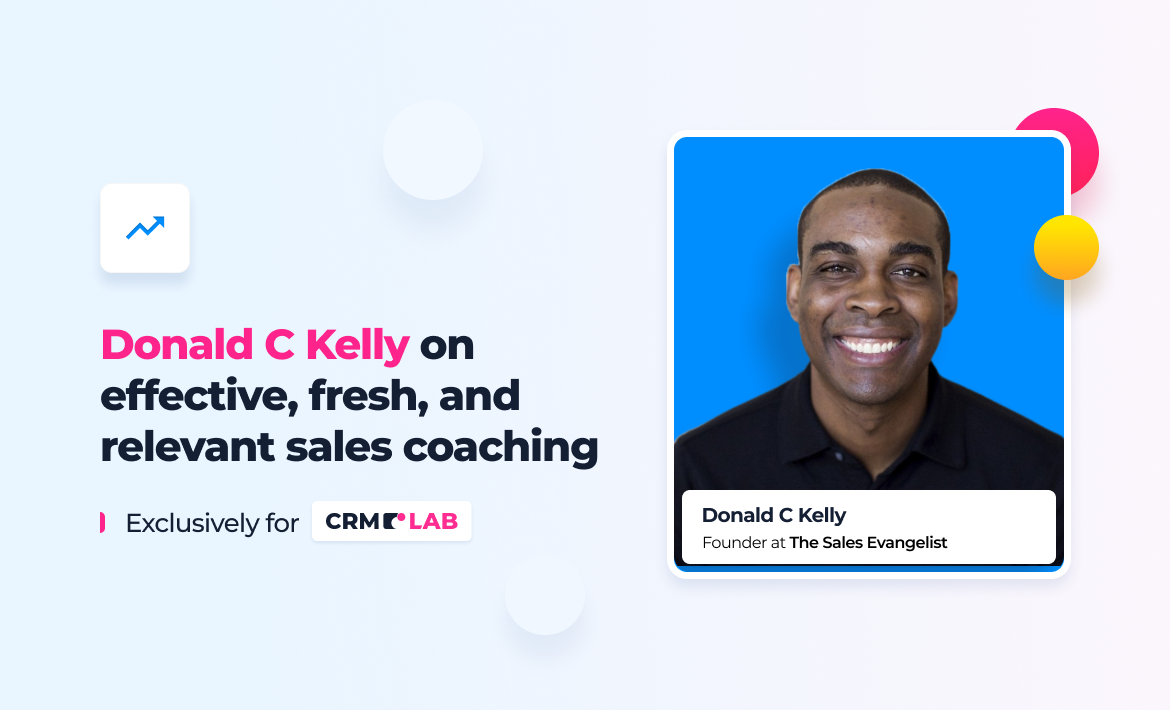If you're a sales leader, you've got a lot on your plate. But if you're not providing your sales team with effective coaching, you're missing a key ingredient to success. It's like trying to bake a cake without flour.
Think about it like a sports team. You wouldn't expect your team to win a game without a coach, right? The same goes for sales. Your team needs someone to provide feedback, guidance, and support. Adequate sales coaching will help them refine their approach, learn new techniques, and build confidence in closing deals.
But beware, the keyword that needs to be highlighted here is “adequate”. If you have no clue about effective coaching, you may actually hinder your sales team’s success and make it insufferable to work by your side.
To help you understand what good coaching is, we turned to Donald C Kelly.
Who is Donald C Kelly?

Donald C Kelly is a renowned sales evangelist, experienced coach, and the founder of The Sales Evangelist.
He’s best known for helping salespeople and entrepreneurs worldwide find effective ways to get more qualified prospects, close more deals, and make more money. Sales training, online courses, 1:1 coaching, workshops, seminars, and dynamic presentations are his speciality!
In this exclusive interview for CRM Lab by NetHunt CRM, Donald shares his go-to approach to sales coaching, talks about the optimal coaching frequency, discusses the best way to structure coaching sessions for maximum results, and more!
At the end of the day, sales coaching is the flour in your cake, the coach on your sideline, and the secret sauce to sales success. Keep reading if you don’t want to leave your sales team hanging.
— How do you identify the areas where salespeople need coaching?
You need to consider three things when identifying areas where salespeople need coaching:
- The salesperson’s assessment of their performance
- The leader’s (your) assessment of the salesperson’s performance
- The CRM data
First of all, provide your salespeople with a list of activities they perform regularly and get them to rate their performance on a scale from 1 to 5 or 10. Make sure to collect the results of this self-assessment in private as people tend to be more honest then.
Usually, salespeople can pinpoint areas where they feel like they lack skill or knowledge and could improve.
Then, as a sales leader, you need to objectively assess the performance of your team and each team member individually.
Finally, to back your observations with hard facts, pull up the CRM data and reports, see whether there’s any stalling in the sales process and spot bottlenecks in the sales pipeline, etc.

The final list of things you need to work on lies somewhere in the middle of all three.
— Let’s talk about frequency. From your experience, how often should sales leaders conduct coaching sessions with their team members?
It depends on who you’re coaching. The key factors determining the optimal frequency of coaching sessions include the nature of your business, the skills of your salespeople, and how long the coachee has been at your company.
With new sales hires, there's much more coaching to do than with someone who’s been a part of your team for a while. You need to assess their skills, identify their areas for improvement, introduce them to company-specific techniques, and share sales tips and tricks that work well on your ICPs.
I’d say, when a new person joins your sales team, you should have coaching sessions at least once or twice a week. While a schedule like that might seem a bit intense, meeting up often will help to ensure you have enough time to cover everything that needs to be covered.
Once you get past the initial stage, you can gradually reduce the number of sessions to once per month.
That way, coaching sessions will remain regular but won’t be a burden to your team. At the end of the day, you don't want to reduce the productivity of your salespeople by distracting them from meetings with leads and clients.
It’s also important to remember that there should always be a point of contact between you and your team. A need for support may arise at any time, and it's best to provide it as soon as possible. That’s why you shouldn’t limit your coaching exclusively to coaching sessions.
☝🏻 Create a separate Slack channel/Google Chats space where all the team members can publish their requests.
Also, adopt a habit of regular check-ins with your team and each member thereof individually.
— Speaking of team-wide sessions vs individual sessions, which format would you say is more productive?
It’s rare for team-wide coaching sessions to be as productive and effective as individual ones.
There’s a simple reason for that: everyone on the team has different scopes of work, different processes, and different challenges to overcome.
If you call in all members of your sales team for a massive group coaching session, it becomes difficult to tend to the needs of each and every one of them.
Even if you manage to build a comprehensive session like that, there’s a high chance it will be too long and unfocused, with parts of it irrelevant to some attendees.
For instance, lead generation specialists might not be interested in learning more about handling sales objections; sales reps won’t necessarily need a coaching session in managing a team, and so on.
As a result, some people will feel bored and discouraged from showing up at subsequent meetings.
This is the last thing you want to happen. Coaching sessions shouldn’t feel like a tedious chore. Instead, they should be seen as an opportunity to learn and improve.
So, it’s best to resort to 1:1 coaching sessions, where you can provide relevant guidance to each member of your sales team individually. They tend to be the most resultative.
That being said, it doesn’t mean that you shouldn’t ignore group sessions completely.
When structured correctly, group coaching sessions can offer the benefits that 1:1s usually lack. For example…
- Roleplay
- “Peer coaching” sessions
- Group activities
- Live activities that require collaborative input, etc.
— You mentioned well-structured coaching sessions. Let’s talk about this a little bit more. How should sales leaders structure their coaching sessions for maximum effectiveness?
Of course, it all comes down to the type of coaching session you hold (individual or group coaching), the person you're coaching, and the areas in which they need coaching. You need to consider all these little details when structuring the meeting.
However, if we’re talking about the general structure of a coaching session, let me share the framework I use.
Generally, I start with an icebreaker to build rapport with the person I’m coaching.
For instance, you could ask them about their long-term money-related goals: Are they looking to buy a car, put a down payment on a house, or go on an expensive vacation?
When the connection is established, go into discussing a work goal you set at the previous coaching session.
Ask about the tasks your team member has been working on since your last session, whether or not they managed to achieve the goal, and figure out whether they faced any difficulties and how they overcame them.
Set the agenda for the session, and briefly explain what you’ll go over in the next hour or two. After the coachee knows what to expect, start — well — coaching.
Once you’re done sharing your wisdom, together with the coachee, set a goal they need to meet after completing the training.
And finally, circle back to what you discussed at the beginning of the session. Put emphasis on how meeting this work goal will help them achieve their personal goals of making more money.
The framework for structuring a coaching session…
- Build rapport with the coachee
- Discuss the goal you set at the previous coaching session
- Set the agenda for the meeting
- Coach: Share tips, tricks, and best practices
- Together with the coachee, set a goal they need to meet after the session
- Explain how meeting the work goal will help the coachee to meet a personal goal
— One of the steps you talked about was setting goals. What happens if the team member fails to achieve the goals you set at the session? How do you balance the need to hold salespeople accountable with the need to provide support and guidance?
If a salesperson fails to meet a goal after a coaching session, you need to get to the root of the problem and understand why it occurred. Based on that, you can make further decisions.
Let’s imagine the following scenario…
You held a coaching session with a sales rep, where you agreed that they’d have to close 10 deals a month. However, fast-forward a month, and you see that they only managed to win two deals.
You need to analyse their activity throughout the month and see whether or not they’ve been engaging in meaningful activities. Have they sent the 500 emails they were supposed to send, followed up consistently, prioritised the leads, etc.?
If they have not, the answer lies on the surface: They’re not doing their job right and should be held accountable.
If they have, yet to no avail, you need to analyse each of these meaningful activities and pinpoint the bottleneck. Then, hold a coaching session where you’ll provide the resources to remove it.
In case that still doesn’t work… It could be the case that the salesperson in question isn’t carved for sales work, and would perform better in a different role within a company, like marketing or customer support.
It’s also worth mentioning that you should get the salesperson involved in the process of outlining the repercussions for not meeting their quota.
— How do you keep your coaching fresh and relevant, especially in a fast-changing sales environment?
You’ve rightfully noticed that the world is changing at an expeditious pace.
As a result, sales change, too. Various crises (like economic recessions or global pandemics), rapid technological advancement, and socio-cultural changes all affect sales, swiftly revamping their landscape.
If you want your sales coaching to bring results, you need to ensure that it’s adjusted to these changes. You don’t want to share outdated, ineffective tips and tricks with your team — that would be a waste of time!
It’s vital to keep things fresh and relevant.
Now, there are a few ways to do that.
First and foremost, you need to understand that a sales coach that can only share theoretical knowledge is unlikely to be successful. The same goes for sales leaders used to be adroit sellers about 30 years ago, but haven’t practised selling since.
Textbook scenarios may not be relevant to your specific company and the particular challenges your team faces. That type of knowledge may not account for the peculiarities of the target audience you sell to, and, therefore, impede your growth rather than accelerate it when passed on to your team members.
You need to go out in the field and regularly practise sales yourself. That way, you’ll know exactly what works and what doesn’t.
“I spend at least two hours every day prospecting.”
Then, of course, education. To keep your sales coaching relevant, you should regularly attend training sessions.

Finally, as the founder and — more importantly — the host of The Sales Evangelist Podcast, I get to network with and meet many seasoned sales professionals from different companies across various industries.
When preparing for a podcast episode, I try to learn more about the guest, and the topic we’re going to discuss, and — ideally — set at least a rough direction for the conversation. Of course, to do that, I do lots of research. As a result, I get to stay up to date with all the latest advancements in the field.
But the preliminary research isn’t all being a sales podcaster has to offer. The conversation itself is a source of knowledge, too.
Guests share insights into the latest sales techniques, strategies, and trends. At the end of the day, that’s what they’re there for, right? Thanks to that, I hear about innovative sales approaches first-hand, from people who practice sales daily.
The best thing is that I get to ask specific questions and delve deeper into the topics that interest me — and the podcast listeners — the most. In a way, being a host of a podcast about sales is like a sales coaching session for a sales coach. 😉
But even if you aren’t a podcaster per se, you can benefit from podcasts by being on the other side of the stream, in the audience. Find the podcasts, blogs, or newsletters you like, subscribe to them and get a portion of high-quality fresh sales content on a regular basis.

It doesn’t require lots of effort on your part, but will definitely transform your sales coaching for the better.
To keep your coaching fresh and relevant…
- Practice sales yourself
- Regularly attend relevant sales training programs
- Network and exchange insights with other sales professionals
- Listen to dedicated podcasts and read blogs
— And how do we keep coaching sessions interesting for the team?
Ensuring your sessions are fresh and relevant should already be enough to make things interesting. For your sales team, coaching sessions are a stellar opportunity to up their game and become better professionals.
However, I agree that sometimes it takes more than that.
To make sure your team members look forward to your coaching sessions, put the focus on them: ask them what they need, and tailor the sessions to their current needs.
And to keep things fun, you can experiment with different session formats. For example, you can conduct live calls...
Have the group join a real call with a real customer. One person would do all the talking (just like they normally would), and the rest would be on mute, following and analysing the conversation.
After the end of the meeting, have everyone share their insights, discuss the good and the bad of the call, and suggest ideas on how the conversation could’ve been improved.
That’s it. Many thanks to Donald for sharing his invaluable insights. Now you should have a much better idea of how to go about coaching your sales team.
But just in case, let’s recap…
- Identify areas for coaching by combining the results of salespeople’s self-assessment, your observations, and CRM data.
- Conduct sales coaching sessions once or twice a week for new sales hires, and once a month for experienced ones.
- Aim for individual sales coaching sessions, only resort to group ones when planning activities that require collaborative input.
- Develop a specific framework to keep your sales coaching sessions focused and structured.
- Don’t jump to conclusions when your coaching doesn't bring the desired effect. Get to the root of the problem first, and base your further decisions on that.
- Attend training programs, network with sales leaders, and regularly practise sales yourself to keep your coaching fresh and relevant.
- Experiment with different coaching session formats and techniques to make your sessions exciting for the coachees.
Remember, when it comes to sales coaching, data is always king, so make sure you keep yours clean and organised with the help of NetHunt CRM.
Give NetHunt CRM a try — the first 14 days are on us 👀
Table of Contents
Crack the sales formula with CRM Lab
Twice a month, receive actionable CRM content to your inbox.




